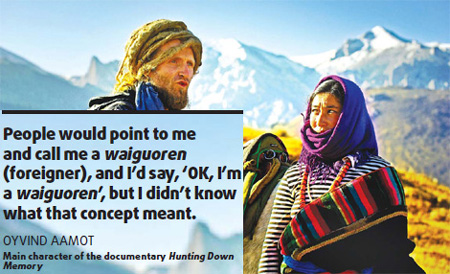Norwegian traveler in search of nomadic tribe in Tibetan areas
2009-08-14 19:22 BJTSpecial Report: Tibet Channel |
BEIJING, Aug. 14 -- Norwegian Oyvind Aamot says his first memory in life was speaking Chinese on a train in China at age 27. He didn‘t realize he was on a train, that he was speaking Chinese or that he was a foreigner. He didn‘t know what any of these things meant.

Oyvind Aamot talking with a Tibetan woman in Sichuan Province during his journey to make the documentary Hunting Down Memory. (Source: China Daily)
He also didn‘t remember who he was, where he came from or anything about his identity or past. "People would point to me and call me a waiguoren (foreigner), and I‘d say, ‘OK, I‘m a waiguoren‘, but I didn‘t know what that concept meant," Aamot says in an articulate manner, which doesn‘t reflect his wild and woolly appearance.
The nearly 20 brain specialists who later examined him described his retrograde amnesia as a "wiping out of his hard-drive". But he‘d have a long way to go before his diagnosis and an even longer journey to reconstruct an identity.
Six years later, he‘d return to retrace his 2000 route to discover what had happened in the three missing weeks before his memory vanished for which he had no record. He also hoped to learn how he got amnesia.
This journey was filmed and turned into the recently released 80-minute documentary Hunting Down Memory. The film was shown at a small, private viewing at the Nordic Film Festival in Beijing last month and will be screened at the Guangzhou International Documentary Festival in early December.
Soon after he got off the train in Zhangjiajie in 2000, several strangers sifted through his possessions for clues about his identity. He says it was only several years later that he developed a sense of gratitude for these strangers‘ help.
"It wasn‘t that I wasn‘t grateful to them; I just didn‘t know what (gratefulness) was and what they were doing," Aamot says.
They explained to him that his passport and money were important. They put him on a bus to Hubei‘s provincial capital Wuhan and told him to call a number they‘d found in his backpack when he arrived.
"But the last thing they said before I got on the bus wasn‘t necessarily the first thing I thought of when I got off the bus," Aamot says.
So he wandered around the city for several hours, taking in an astonishing new world with a childlike understanding of what he was seeing.
"It was Christmas Eve, and some people in red were handing out presents," he recalls.
"I didn‘t really know what to do with them, so I just passed them along to other people."
He never thought to unwrap them to see what was inside, he says.
After he got tired, he saw a red phone on the side of the street, remembered about the phone number and dialed it. On the other line was his friend Wu Wei, vocalist of the city‘s celebrated punk band, SMZB.
Wu was surprised Aamot didn‘t remember him on the phone but figured he was deliriously exhausted from traveling. He became worried when Aamot greeted him with an unrecognizing blank stare when he came to pick up the Norwegian.
"He really didn‘t get it," Aamot says. But he couldn‘t detect his friend‘s anxiety.
"I really didn‘t perceive so much of people‘s deeper feelings."
When Aamot also didn‘t recognize Wu‘s mother or old friends who visited his apartment, they took him to a doctor.
The doctor confirmed Aamot had lost his memory, and recommended he visit a specialized hospital and the Norwegian embassy in Beijing.
The embassy told him to go back to Norway, and friends helped him use his e-mail and password, which was found on a paper scrap among his belongings, to contact his mother.
He then flew home to Norway, where doctors said his condition might have been caused by brain trauma, narcotics, or toxins from food, plants or animals. A diving accident the year before and a high school case of meningitis might have also contributed.
By the time he was examined in Norway, it was two months after the memory loss and too late to determine its cause. All doctors could find was an abnormality on the back of the brain that was too small to test.
Aamot learned he had been sailing around China with friends when he left the boat to study Chinese. In his last e-mail to his mother before the amnesia, he said he was leaving to search for a "nomadic Rasta horse tribe" in Tibetan areas.
Three weeks later, he awoke on the train.

 Mail
Mail Share
Share Print
Print


 Video
Video









 2009 China Central Television. All Rights Reserved
2009 China Central Television. All Rights Reserved